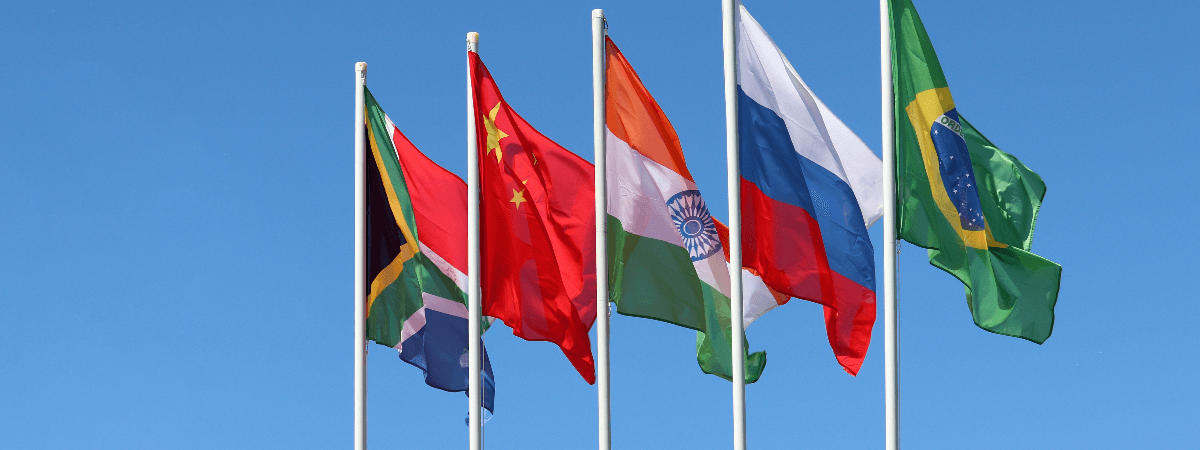BRICS Leaders to Discuss Expansion of the Bloc, Brazilian Top Diplomat Says
By Hou Wuting and Kelly Wang


Leaders from some of the world’s major emerging economies are set to meet in Johannesburg next week for the 15th BRICS Summit, where they will discuss topics including the potential expansion of the bloc, geopolitical issues such as the Ukrainian crisis as well as deepening the use of local currencies in trade.
The summit is the first in-person gathering of the group — comprised of Brazil, Russia, India, China and South Africa — since the Covid-19 pandemic.
Brazil hopes to take advantage of the event to reestablish its presence on the world stage, while highlighting the foreign policy goals of its current administration under President Luiz Inácio Lula da Silva, the country’s foreign minister told Caixin in a written interview last week.
“The BRICS have grown and matured as a relevant forum to coordinate positions in global affairs and will keep having a key role in crafting a new world order,” said Brazil’s chief diplomat Mauro Vieira.
BRICS, originally founded in 2006 with four member states under the abbreviated name of BRIC, had expanded in 2011 to include South Africa. In recent years, it has attracted interest from several states.
More than 20 countries — including Indonesia, Argentina and the Middle Eastern nations of Saudi Arabia, Iran and Egypt — have formally requested to join the bloc as full members, South African officials revealed in July. There are also more than 20 other nations that have informally expressed interest in joining, the officials added.
Vieira believes such interest is “clear evidence of the global importance of the BRICS,” adding that forming a consensus around the idea of expansion and on the criteria of admitting new members would be “key to the continuing success of the group.”
“BRICS draws its strength from the regional and global importance of its current members,” he said, noting how this will factor into discussions for accepting new members.
During a press conference early August, Lula said “I think it’s extremely important for us to allow other countries that meet BRICS demands to join the bloc,” according to a transcript released by the president’s office.
However, not everyone is on board within the country’s political system, as some worry that the BRICS expansion could reduce Brazil’s own influence, Brazilian political scientist Maurício Santoro told Caixin.
In terms of the Russia-Ukraine conflict, Vieira thinks BRICS and its members can be “facilitators” in the process of working towards a negotiated solution. He said the upcoming Johannesburg summit could be a “perfect occasion” for the members to discuss the issue with Russia, during a press meeting in Brasilia which Caixin attended at the end of July.

Russia was not present at the previous two peace forums, which were aimed at resolving the crisis, held in Saudi Arabia and Denmark earlier this year. Although Russia’s President Vladimir Putin will not attend this year’s BRICS summit in person, he will send the country’s Foreign Minister Sergey Lavrov as a representative.
“Peace will only come as a result of a collective effort, the broader the alliance for peace, the better for everyone,” Vieira said.
Discussions on currency diversification have also been reportedly slated for the summit which kicks off Aug. 22. Lula has been vocal about trading in local currencies and even establishing a common currency for BRICS members.
Vieira said such efforts are meant to “offer an alternative, not to eliminate the U.S. dollar,” admitting that it is still “too early to expect results” in the area.
In addition, the Brazilian foreign minister painted an optimistic outlook regarding Sino-Brazilian relations, especially after Lula’s state visit to China in April, where the two countries’ leaders agreed to further cooperation in trade and climate change.
“It is clear to me that the possibilities to further deepen the relationship are endless,” Vieira told Caixin, stating that Brasilia also hopes to enhance ties with Beijing in areas including science and technology as well as energy transition.
Read also the original story.
caixinglobal.com is the English-language online news portal of Chinese financial and business news media group Caixin. Global Neighbours is authorized to reprint this article.
Image: Oleg– stock.adobe.com
